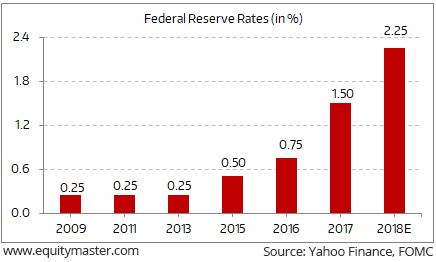Indian Indices Trade Marginally Lower; Energy Stocks Witness Losses
Share markets in India are presently trading marginally lower. Sectoral indices are trading on a mixed note with stocks in the energy sector and auto sector witnessing maximum selling pressure. Stocks from the IT sector are trading in the green.
The BSE Sensex is trading down 107 points (down 0.3%) and the NSE Nifty is trading down by 40 points (down 0.4%). The BSE Mid Cap index is trading down by 0.2%, while the BSE Small Cap index is trading flat. The rupee is trading at 65.02 to the US$.
In the news from global financial markets, according to an official account of the Federal Reserve's most recent policymaking meeting, robust growth in the US economy has increased the confidence of Federal Reserve officials that the country is ready for higher interest rates.
The account said Fed officials have upgraded their economic outlooks since the beginning of the year. They have listed three main reasons for the rise in interest rates which are the strength of recent economic data, accommodative financial conditions and the expected impact of the US$ 1.5 trillion tax cut that took effect in January.
Many expect that a tightening labour market and increased government spending would further boost inflation and will force the Fed to be more aggressive in raising interest rates this year. This, in turn, would slow down the economic growth.
The Fed has forecast three rate hikes this year. The first increase expected at its next policy meeting in March.
In its latest meeting, the Fed said it expects "further gradual" rate increases. The target range for the federal funds rate currently is 1.25% to 1.50%.
Note that with the US economy chugging along for many months, the Fed is now gradually easing off the stimulus it provides to the economy by raising interest rates to more normal levels.
Federal Reserve Rate Hike in the Past 3 Years

How does a US interest rate hike affect Indian investors?
The instant effect is foreign money moving out of India's vaults. This means a slight correction in the share market in India, albeit temporarily.
While this might provide a good buying opportunity in long-term stocks, the main thing to look forward would be capex and earnings trends.
In the end, Indian investors are better off staying informed about the corporate earnings revival than Fed rate hikes.
In other news, as per a leading financial daily, the National Stock Exchange (NSE) is undertaking an index rejig which will mean new inclusions of Bajaj Finserv, Grasim Industries, and Titan Company.
The above stocks will be replaced by Ambuja Cements, Aurobindo Pharma, and Bosch.
The exchange also stated that the above replacements will also be applicable to Nifty 50 Equal Weight Index.
Apart from the above, the exchange effected changes to broader indices, too. It stated that Punjab National Bank (PNB) will move out of the NSE's Nifty Midcap 100 index from April.
On the Nifty 100, GSK Consumer Health, GSK Pharma, Glenmark Pharma, Tata Power and Torrent Pharma have been excluded and replaced by Aditya Birla Capital, General Insurance Corporation of India, Grasim Industries, L&T Finance Holdings and SBI Life.
Also, Nifty Free float Midcap 100 will be renamed as Nifty Midcap 100 effective from April 2.
Disclaimer: Equitymaster Agora Research Private Limited (hereinafter referred as 'Equitymaster') is an independent equity research Company. Equitymaster is not an Investment Adviser. ...
more


